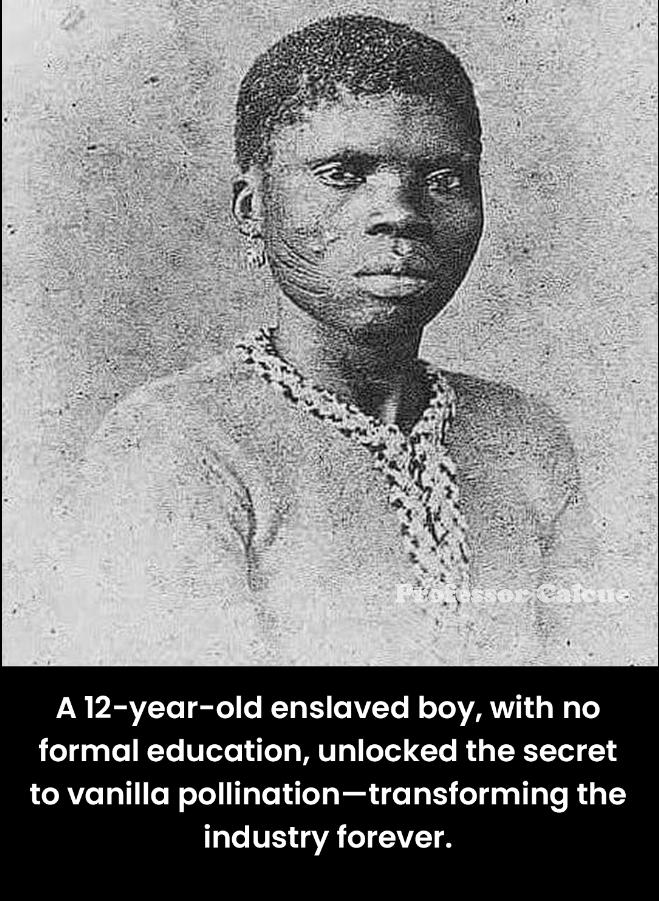“In 1841, on the lush, volcanic island of Réunion, a moment of quiet brilliance unfolded. A 12-year-old enslaved boy named Edmond Albius, with no formal education or scientific training, made a discovery that would forever alter the course of culinary history, forever changing the way we savor the delicate, intoxicating flavor of vanilla.”
A Botanical Puzzle: The Challenge of Vanilla Pollination
- The Mystery of the Barren Orchids:
- At the time, vanilla plants cultivated outside of their native Mexico remained stubbornly barren, failing to produce the coveted vanilla pods. The reason lay in a delicate ecological balance: the vanilla orchid’s sole natural pollinator, a specific species of Melipona bee, was indigenous to Mexico.
- Consider the situation of those early botanists. They had transported these precious orchids, hoping to cultivate a valuable crop. Instead, they faced frustration, the plants blooming, but never fruiting.
- Failed Attempts: The Scientists’ Struggle:
- For years, esteemed scientists and botanists had toiled, attempting to replicate the intricate pollination process by hand. They experimented with various tools and techniques, yet their efforts yielded no success. The delicate anatomy of the vanilla orchid, with its hidden reproductive organs, presented a formidable challenge.
- Historical accounts detail learned men, perplexed, spending countless hours in frustrated attempts to copy natures perfect design.
A Moment of Genius: Edmond’s Ingenious Technique
- The Boy’s Intuition: A Simple Solution:
- Edmond Albius, an observant and resourceful young boy, possessed an innate understanding of the natural world. Without the benefit of formal education, he approached the problem with a fresh perspective, unburdened by the preconceived notions of scientific convention.
- Envision young Edmond, carefully studying the vanilla orchids, paying close attention to every detail of the flower’s structure.
- The Gentle Touch: A Stick and a Revelation:
- Using a simple tool—a small stick or a blade of grass—Edmond gently lifted the labellum and pressed the male and female parts of the flower together, mimicking the action of the Melipona bee. His technique, simple yet ingenious, proved remarkably effective.
- Picture the delicate motion, the precise manipulation that brought about such a revolutionary change.
A Global Transformation: The Legacy of Vanilla
- An Industry Revolutionized: Vanilla’s Global Reach:
- Edmond’s groundbreaking technique made it possible to cultivate vanilla anywhere the plant could thrive. Islands like Réunion and Madagascar, with their ideal tropical climates, were transformed overnight into global vanilla powerhouses.
- The result was a boom, an explosion of Vanilla production, that would forever change the culinary world.
- A Bittersweet Legacy: Unrecognized Genius:
- Though Edmond was granted his freedom in 1848, his contributions remained largely unrecognized during his lifetime. He died in poverty, his genius overshadowed by the prevailing social injustices of the era.
- Sadly, the man who unlocked such a great wealth, never shared in it.
A Lasting Impact: The Sweetness of Remembrance
- The Flavor of Innovation: A Boy’s Enduring Mark:
- The next time you savor the delicate sweetness of vanilla, remember Edmond Albius, the young boy whose quiet brilliance continues to leave its mark on the world.
- His story is a reminder of the power of observation, the value of intuition, and the enduring impact of human ingenuity, regardless of social standing.
Conclusion
“Edmond Albius, an enslaved boy from Réunion, possessed a quiet brilliance that forever transformed the world’s relationship with vanilla. His ingenious technique, born of observation and intuition, unlocked the secrets of vanilla pollination, revolutionizing an industry and leaving an enduring legacy. Though his life was marked by hardship and his contributions were initially overlooked, his story serves as a testament to the power of human ingenuity and the enduring sweetness of his discovery.”
